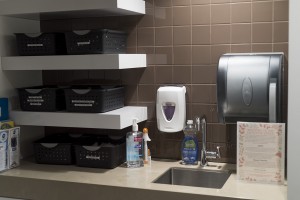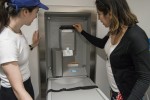A newly renovated lactation room in the Student Activities Center held its grand reopening Friday afternoon as part of an effort to improve the climate for mothers on campus.
The lactation room provides breastfeeding mothers a private, designated space on campus to breastfeed. About 23 people attended the opening, which was held by the UCLA Fielding School of Public Health student project Creating Space, the Bruin Resource Center Students with Dependents Program and the UCLA Healthy Campus Initiative.
The renovated room is now equipped with a private lock, a sink, electrical outlets and other lactation supplies, said Jean Libby, the program director of Students with Dependents.
She added the room closed in spring 2016 because of its lack of privacy and was reopened at the end of fall quarter. Creating Space held the grand reopening this quarter instead of in the fall because of timing issues and because the group wanted to mark the completion of the three staff members’ trainings.

Prior to closing for construction, the lactation space doubled as a break room, Libby said.
Dion Veloz, manager of the Student Activities Center, said that the plan to create a lactation room began eight years ago when the SAC Board of Governors introduced the idea.
“The people on the Board of Governors were really the ones to spearhead the project,” Veloz said. “They helped with coming up with the main concepts for the room and looking for appropriate spaces in the building.”
Veloz said that finding a space in the SAC building to convert into a lactation room was a big challenge. The board ultimately decided to split a break room in half and convert it into the lactation room and a gender-neutral restroom.
“We really want to create all-inclusive spaces for students and support parenting mothers,” Veloz said.
Emily Bell, co-chair of the Service Delivery Committee of Creating Space and public health graduate student, said Creating Space is a collaborative project with the aim to support breastfeeding mothers on campus by improving lactation education, accommodation and support.
“We want to encourage breastfeeding as a best nutritional practice,” Bell said. “We see this as a public health and women’s rights issue.”
Bell added three UCLA staff members were trained and became certified lactation educator counselors at the end of winter quarter. They will be providing services for mothers on campus and education services through the Arthur Ashe Student Health and Wellness Center, the Health Education and Promotion Office and the Bruin Resource Center, Bell said.
Libby, one of the staff members who completed the training, said the Friday event demonstrates both the availability of these services and the potential for creating more of these spaces on campus.
Bell said the Needs Assessment Committee of Creating Space plans to launch a study about the climate for mothers on campus May 1. The study will entail speaking with mothers on campus to capture their experiences, positive or negative, and analyzing the other lactation rooms on campus to see if they are adequate spaces for mothers.
Bell added that Creating Space has been working with the Ashe Center, UCLA Sustainability, the Healthy Campus Initiative, the Bruin Resource Center, the Health Education and Promotion Office and the Title IX office to conduct their research.
Marisa Rodriguez, a third-year history and gender studies student, said that while she does not use the lactation spaces on campus, she still strongly supports the parenting students community.
“The lactation services on campus are not completely sufficient,” Rodriguez said. “I think there is more than can be done, but this is still a big help to parenting students.”
